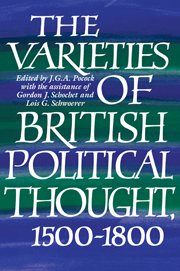10 - Why should history matter? Political theory and the history of discourse
Published online by Cambridge University Press: 04 August 2010
Summary
Introduction
This chapter, unlike its predecessors in this volume, is concerned more with the present than with history. My points of departure are the modern state – especially in its English-speaking form – and its political theory and politics in the late twentieth century. That state, its theory, and the world they both occupy are all ‘products’ of the past, and I have an interest in the way they were ‘produced’, a process that is still under way. My concern, therefore, is not so much with the reconstruction of the past as with understanding its use by the present and how it seems to constrict modern possibilities. Although no full theory of historical change is offered or even hinted at here, pieces of a partial theory are scattered through my argument.
Like the other contributors, I approach political thought as a ‘discursive’ or ‘linguistic’ phenomenon and regard language, broadly conceived, as the primary source of historical continuity. It is the principal means by which, individually and as members of cultures who share traditions, people make sense of and participate in their worlds.
Throughout, I treat the state as something of a linguistic construct that is maintained by a continuous commentary on its tradition, a kind of political hermeneutics. I contend that the modern Western state is wedded to a participatory and even democratic ideology and that a significant part of its history – and of the internal conflicts that populate the histories of individual states – has been about the fulfillment of that commitment.
- Type
- Chapter
- Information
- The Varieties of British Political Thought, 1500–1800 , pp. 321 - 357Publisher: Cambridge University PressPrint publication year: 1994
- 3
- Cited by

